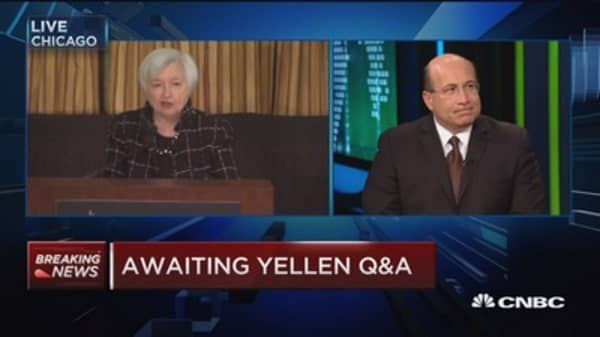The stock market has churned a bit in the last few days. Some Wall Street wags have suggested that concerns over the President's tweet storm over the weekend, or North Korea's missile firings, may have been behind the stall in the market.
Certainly, political uncertainty, and geo-political risk, have caused some consternation in global markets, while concerns about the pace of gains in stocks, coupled with perceived lofty valuations have also provided a mild headwind on Wall Street in the last few days.
While the market appears to be happily embracing a coming rates hike from the Federal Reserve, it seems to me that market participants may have glossed over a very important comment from Fed Chair, Janet Yellen, last Friday.
The markets appear to be welcoming a rate hike, also known as policy normalization, because it indicates the economy is finally strong enough to withstand higher rates and less dependent on easy money to survive and thrive.
However, Chair Yellen used a word that I have not heard in almost a decade to describe the coming shift in policy and I suspect it is a word that has a more important meaning than the market currently accords it.
Here it is, in a nutshell, where Chair Yellen is signaling a very important shift in policy:
"As I will explain, this policy stance seems appropriate given that the underlying trend in inflation appears to be still running somewhat below 2 percent. But as that gap closes, with labor market conditions now in the vicinity of our maximum employment objective, the Committee considers it appropriate to move toward a neutral policy stance."
(Janet Yellen's Speech to the Executive's Club of Chicago, 3/3/17)
For the first time in nine years, the Fed is openly discussing a neutral interest rate policy, which to paraphrase Yellen, is neither accommodative nor contractionary.
That is a very big deal given all of the Fed's most recent statements have suggested that policy will remain accommodative despite expected increases in the interest rate that the Fed controls.
If the Fed, indeed, follows through with a rate hike on March 15th, as indicated, markets, as much as ever, need to parse the Fed's language to determine if the size and scope of rate hikes could accelerate in the relatively near future.
Chair Yellen has indicated that if fiscal policy becomes expansive that could very well be the case. Under those circumstances, one would be wise to reconsider how rate hikes will affect the markets in the weeks and months ahead, given current valuations.
While I remain constructive on the stock market, in anticipation of fiscal stimulus and tax rate reductions, I am becoming slightly more wary, in the wake of Chair Yellen's "neutral" comment, of Fed policy going forward.
It has long been deemed to be the Fed's job to take away the punch bowl before the party gets started. The Fed, expecting the party to get a little wild if we see tax reform, massive de-regulation, a $1 trillion infrastructure spend and a 10 percent increase in defense expenditures, could get a little more sober than the rest of us, at a slightly faster clip. And we may be simply too inebriated to notice the buzz kill.
Of course, it takes more than three small, widely spread out rate hikes to slow, or kill, a bull market. And, any political disruptions that delay fiscal stimulus could stay the Fed's hand.
However, despite some claims that the Fed is less important, as we shift from an environment where monetary policy is less impactful than fiscal policy, one cannot blithely ignore the central bank, nor its seemingly benign language.
Some have argued the Fed has been drunk with power over the last decade or so. But if the Fed is about to sober up, we may want to have some coffee and aspirin ready, in the event we get a little too tipsy for our own good.
Commentary by Ron Insana, a CNBC and MSNBC contributor and the author of four books on Wall Street. Follow him on Twitter @rinsana.
For more insight from CNBC contributors, follow @CNBCopinion on Twitter.




